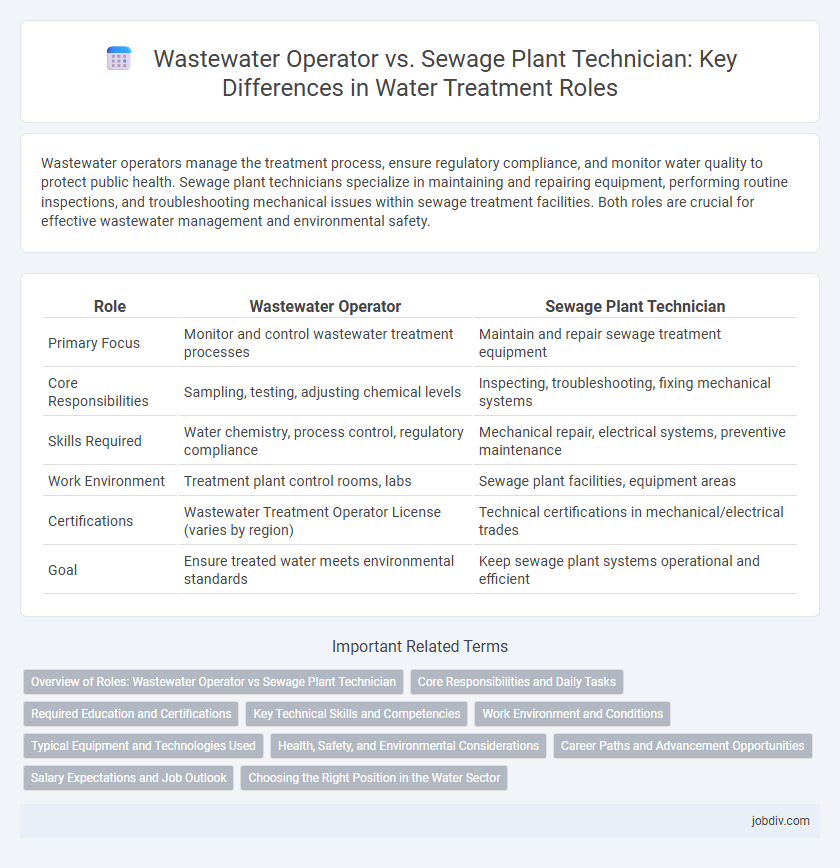Wastewater operators manage the treatment process, ensure regulatory compliance, and monitor water quality to protect public health. Sewage plant technicians specialize in maintaining and repairing equipment, performing routine inspections, and troubleshooting mechanical issues within sewage treatment facilities. Both roles are crucial for effective wastewater management and environmental safety.
Table of Comparison
| Role | Wastewater Operator | Sewage Plant Technician |
|---|---|---|
| Primary Focus | Monitor and control wastewater treatment processes | Maintain and repair sewage treatment equipment |
| Core Responsibilities | Sampling, testing, adjusting chemical levels | Inspecting, troubleshooting, fixing mechanical systems |
| Skills Required | Water chemistry, process control, regulatory compliance | Mechanical repair, electrical systems, preventive maintenance |
| Work Environment | Treatment plant control rooms, labs | Sewage plant facilities, equipment areas |
| Certifications | Wastewater Treatment Operator License (varies by region) | Technical certifications in mechanical/electrical trades |
| Goal | Ensure treated water meets environmental standards | Keep sewage plant systems operational and efficient |
Overview of Roles: Wastewater Operator vs Sewage Plant Technician
Wastewater Operators manage the daily treatment processes to ensure contamination removal and regulatory compliance, monitoring equipment and chemical usage. Sewage Plant Technicians focus on maintaining and repairing mechanical systems, including pumps, valves, and electrical components, to support continuous plant operations. Both roles are crucial in maintaining public health and environmental standards, with Operators emphasizing operational control and Technicians specializing in technical maintenance.
Core Responsibilities and Daily Tasks
Wastewater operators manage the treatment process by monitoring equipment, conducting routine inspections, and ensuring compliance with environmental regulations to maintain water quality. Sewage plant technicians focus on maintaining and repairing mechanical and electrical systems within wastewater treatment facilities, performing preventive maintenance, and troubleshooting operational issues. Both roles collaborate to ensure efficient plant operations, safeguard public health, and minimize environmental impact.
Required Education and Certifications
Wastewater Operators typically require a high school diploma or equivalent, along with state-issued certification that involves passing a comprehensive exam on wastewater treatment processes. Sewage Plant Technicians often need more advanced technical training or an associate degree in environmental science or wastewater management, coupled with specialized certifications such as the Grade II or III Wastewater Treatment Plant Operator license. Both roles demand ongoing education to stay current with environmental regulations and technology advancements in wastewater treatment.
Key Technical Skills and Competencies
Wastewater Operators and Sewage Plant Technicians both require expertise in monitoring and maintaining water treatment systems, but Wastewater Operators focus more on operational control of pumps, valves, and chemical dosing to ensure regulatory compliance. Sewage Plant Technicians emphasize diagnostic skills for mechanical and electrical troubleshooting, system repairs, and preventive maintenance of treatment equipment. Both roles demand proficiency in data analysis, knowledge of regulatory standards such as EPA guidelines, and strong problem-solving abilities to optimize wastewater treatment processes.
Work Environment and Conditions
Wastewater operators typically work in treatment plants handling the processing and purification of sewage and industrial waste, often exposed to varying weather conditions and potential chemical hazards. Sewage plant technicians focus on maintaining and repairing equipment within wastewater facilities, requiring technical skills to manage mechanical systems in controlled indoor environments. Both roles demand adherence to safety protocols, but wastewater operators encounter more fieldwork, while technicians work predominantly in mechanical and electrical troubleshooting.
Typical Equipment and Technologies Used
Wastewater operators typically manage equipment such as pumps, aeration systems, and chemical feeders to treat and process wastewater efficiently. Sewage plant technicians often specialize in maintaining and repairing advanced machinery like clarifiers, grit removal systems, and sludge dewatering equipment integral to sewage treatment plants. Both roles require expertise in SCADA systems and laboratory testing instruments to monitor water quality and ensure regulatory compliance.
Health, Safety, and Environmental Considerations
Wastewater operators and sewage plant technicians both play crucial roles in managing water treatment processes, but their health, safety, and environmental responsibilities differ slightly. Wastewater operators focus primarily on monitoring treatment systems to prevent hazardous exposure to contaminants and ensuring compliance with environmental regulations to protect ecosystems. Sewage plant technicians often handle equipment maintenance and repairs, requiring strict adherence to safety protocols to prevent accidents and mitigate risks from toxic substances released during sewage processing.
Career Paths and Advancement Opportunities
Wastewater Operators typically gain hands-on experience managing treatment processes and equipment, while Sewage Plant Technicians specialize in monitoring system functionality and performing technical maintenance. Career advancement for Wastewater Operators often leads to supervisory roles or certification as senior plant operators, whereas Sewage Plant Technicians may progress into specialized engineering support or system design positions. Both paths offer opportunities for professional development through state certifications and technical training programs that enhance expertise in water quality management and regulatory compliance.
Salary Expectations and Job Outlook
Wastewater Operators typically earn a median salary of $50,000 annually, with growth prospects aligned with increasing urban infrastructure needs. Sewage Plant Technicians, specializing in advanced system maintenance, often command slightly higher salaries averaging $55,000 due to technical expertise requirements. The job outlook for both roles remains positive, driven by a growing emphasis on environmental regulations and infrastructure upgrades across municipal and industrial sectors.
Choosing the Right Position in the Water Sector
Wastewater Operators oversee the treatment processes that remove contaminants from sewage to protect public health and the environment, requiring skills in monitoring equipment and chemical use. Sewage Plant Technicians focus on maintaining and repairing the mechanical systems within treatment facilities, ensuring continuous operation and system efficiency. Choosing the right position depends on whether you prefer operational control and regulatory compliance as a Wastewater Operator or technical maintenance and hands-on equipment repair as a Sewage Plant Technician in the water sector.
Wastewater Operator vs Sewage Plant Technician Infographic

 jobdiv.com
jobdiv.com